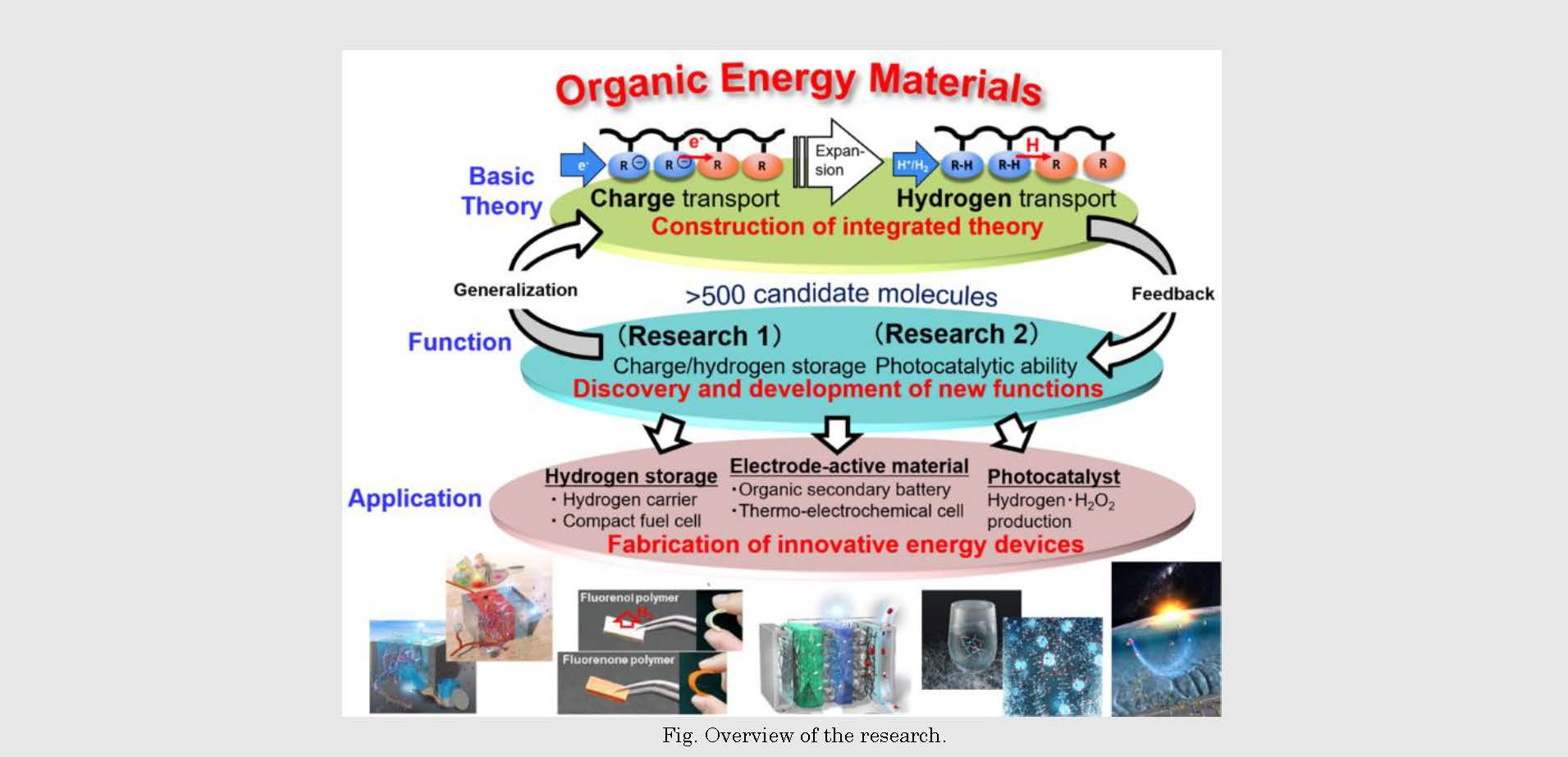
IMRAM
Institute of Multidisciplinary Research for Advanced Materials, Tohoku University
東北大学
多元物質科学研究所

LAST UPDATE 2024/08/20
-
研究者氏名
Researcher Name岡弘樹 Kouki OKA
准教授 Associate Professor -
所属
Affiliation東北大学 多元物質科学研究所
マテリアル・計測ハイブリッド研究センター有機・バイオナノ材料研究分野
Institute of Multidisciplinary Research for Advanced Materials, Tohoku University
Materials-Measurement Hybrid Research Center, Organic- and Bio-Nanomaterials -
研究キーワード
Research Keywords機能性有機材料
電気化学
エネルギー製造・貯蔵・変換・活用
Organic Materials Science
Electrochemistry
Energy Production / Storage / Conversion / Utilization
- 研究テーマ
Research Subject -
エネルギー製造・貯蔵・変換・活用を担う機能性有機材料の開発
Development of Organic Energy Materials
研究の背景 Background of the Research
持続可能な社会の実現に向けて、地球上に豊富な元素から構成され、エネルギー製造・貯蔵・変換・活用を担う、革新的な機能性有機材料の開発が求められている。とりわけ、資源に乏しい我が国において、豊富もしくは持続可能な資源からの材料開発、そしてそれら材料のエネルギー戦略への活用が急務である。そこで、私は、有機材料においてエネルギーに関連した新機能を開拓している(Fig.)。さらに、使用後のリサイクル性も勘案した、新しい有機材料の設計指針も提案している。
Toward the realization of a sustainable society, the development of innovative organic energy materials, which are composed of earth-abundant elements and which play a role in energy production / storage / conversion / utilization, is highly required. I am developing organic energy materials (organic polymeric materials) with the following energy-related functions (1)-(5) (Fig.). (1) Charge storage and transport. (2) Proton storage and transport. (3) Hydrogen gas production and storage. (4) gas selective adsorption and storage. (5) Photocatalysis and clean energy production.
研究の目標 Research Objective
エネルギー製造・貯蔵・変換・活用を担う機能性有機材料の開発を通じて、社会問題・環境問題の解決に貢献することを研究の大きな目標としている。例えば、① 資源リスクのない有機電池、② 水素を安全に運搬できる水素貯蔵材料、③ 有害化学物質や温室効果ガスを選択的に回収可能な材料、④ レアメタルを一切使用しないクリーンエネルギーの製造法、など、将来の持続可能な社会の基盤技術の構築を目指す。
The main goal of our research is to contribute to solving social and environmental problems through the development of organic energy materials that are responsible for the energy production, storage, conversion, and utilization. For example, we are aiming to build the fundamental technologies for a sustainable society of the future, such as 1) organic batteries with no resource risks, 2) hydrogen storage materials that can safely transport hydrogen gas, 3) organic materials that can selectively recover hazardous chemicals and greenhouse gases, and 4) methods for producing clean energy that do not use any precious metals.
研究図Figures

論文発表 / Publications
Angew. Chem. Int. Ed., 63, e202400475 (2024). Int. J. Hydrogen Energy, 72, 815–819 (2024). J. Phys. Chem Lett., 15, 267–271 (2024). J. Mater. Chem. A, 11, 13923–13931 (2023). Polym. Chem., 14, 2588–2591 (2023). Adv. Energy Mater., 11, 2303724 (2021). Energy Environ. Sci., 11, 1335–1342 (2018).
研究者連絡先 / HP
- oka
 tohoku.ac.jp
tohoku.ac.jp - https://www2.tagen.tohoku.ac.jp/lab/kasai/